- Home
- Ian McDonald
Planesrunner (Everness Book One) Page 12
Planesrunner (Everness Book One) Read online
Page 12
Everett winced.
“I've an idea. How about I cook you breakfast?”
“Omis can't cook,” Sen declared. “It's against nature.”
“Not on my world, it's not.”
“Well, if you think you can.”
“You'll thank me.”
The galley was so small they had to shuffle past each other around the table. Again Everett caught Sen's musky, alien perfume. Why did she have to smell like that? Earthy, animal. It was wrong.
“Lesson one.” Everett rescued the frying pan from the dishwasher. “Never wash your frying pan. It destroys the natural nonstick oil layer. Salt, and kitchen roll.” He scrubbed away on the tiny work surface with paper hand towels. “So, your mother.”
“Adopted.”
“Adoptive.”
“What?”
“You're the adopted one. She's the adopter. Adoptive.”
“Ey! You cook, planesrunner. I talk. You can't even speak bona palari.”
Everett looked through the cupboards. Cleverly engineered racks and shelves unfolded out of each other. Everything was as compact and space-saving as an RV. Here were packets and jars with labels from Aegypt, Palestine, Maroc, in Arabic and Cyrillic and alphabets that looked like Hindi but were different from any Indian letter forms Everett had ever seen. The packets were barely used. Many were unopened. Everett sniffed out a tin of Spanish smoked paprika.
“Your ma. The captain,” Everett hinted, taking eggs from the refrigerator. “Eggs at room temperature, by the way. Always.”
“She ended up with me. She had an amriya.”
“A what?”
“Amriya. Like a promise, only you don't get to make it. Someone gives it to you. Like something you'll always owe someone and maybe they'll never collect, but maybe one day they will.”
“She adopted you because of this…this amriya?” Just enough butter in the pan to grease it. And in with the lightly beaten eggs. “So, your parents…are they…what happened?”
Sen gazed out the window. Her eyes were blank, like white ice.
“See that? That's the Lady Constanza. That's a sweet ship, her. See that coat of arms on the prow? Lions and unicorns and all that palaver? That means she's a Royal Mail Liner. Specially licensed by His Majesty's Government to carry His Majesty's mail. That's what Annie wants, that crest on our nose. Bonaroo, that. Get that and you're sorted.”
Everett turned the scrambled eggs out onto a plate. A dust of the paprika and he slid them to Sen.
“Mine are never that colour.” She tried a forkful. The look of ecstasy on her face was so naked Everett almost laughed. This he had learned about Sen in the short time he had known her: she let her feelings shine for all to see, good or bad. “Oh, Everett Singh, those are the best…How did you do that?”
“No milk. Milk makes them tough. Take them off the heat just as they start to set and let them cook in their own heat. And a little Spanish smoked paprika to finish.” Everett ate from the pan, leaning against the hob. The narrow galley table would have put him almost forehead to forehead with Sen. “Annie, that's the captain?”
“You don't call her that. Only I gets to call her that,” Sen said. The ice-blank eyes were angry now. Ice one moment, sun the next, storm the moment after.
“What do I call her?”
“You calls her ‘ma'am.'”
“So if the Lady Constanza carries the mail, what do you carry?”
“Machine parts from Leipzig, kidneys from Prague; asparagus from Danzig, lace from Den Haag; glassware from Oslo and jewels of Tangier; wodka from Moscow and silk from Algiers. We got Seattle circuitry and Jerusalem jam; we got Jakarta gemstones and De Beers diamonds and porn from Nippon would make your eyes water, Everett Singh. If it walks or talks or crawls or shits or makes a noise or is like really, really shiny, we've carried it. I been everywhere, Everett Singh. All the way round this little round world.”
“We have aeroplanes carry freight, but nothing like this.”
“Seen ‘em. Most worlds have ‘em—we're the exception, it seems. The oil thing. Wouldn't feel safe in one of them things. I mean, how do they stay up?”
“Physics.”
“Ain't natural.”
“Most things in the human world aren't natural. It's what makes it the human world. I'll tell you what is natural: bad dentistry and dying of the least little infections. That's natural.”
“Oooh. Get her,” Sen said. Her eyes went wide at Everett's small rant.
“I'm sorry. I just get annoyed when people argue that if a thing's natural, it's right. Natural wants to kill us. Science saves us. Science keeps our planes flying and this airship up.”
“Okay. Whatever you say. Science is bona. But all the same, I don't like those things with wings. You get in, you whizz up whee right over the world, you come down again, you get off, someone else gets on. That's not a home. That's not a—”
Everett saw Sen catch the word “family” in the back of her throat, and saw that she knew he had seen her do that. She looked ashamed and angry. Then her face went from cold to bright, hard to curious.
“Say, Everett Singh, you're the guest on my ship. You tell me about your family. Fair play. First, though…” She pushed the empty plate at Everett. “Is there any more of them eggs?”
“I could make more.” Even as he said the last word, the idea arrived, big and entire and well-shaped and brilliant. “But there's something else I'd rather make. A treat. For you—and the captain. Your ma.”
“Let me get this straight. The Plenitude has kidnapped your father and brought him to our universe.” Captain Anastasia lifted another piece of suji halva from the plate. Everett had seen the fine semolina, the rosewater, all the necessary ingredients tucked away in the infundibular recesses of the galley cupboards while trawling for Sen's breakfast eggs. He had thought nothing of them until Sen's raptures showed him the way to make himself more than excess baggage aboard Everness. The way to the heart is through the stomach. All those post-match Saturday cuisine nights came good in the end. If you went insane over scrambled eggs, just wait until you get some good old-fashioned down-home Punjabi cooking. Grandmother Ajeet had celebrated the least family event with tooth-loosening sweets. And semolina, rosewater, sugar said one thing to Everett. Halva. He watched Captain Anastasia take a polite bite out of the sweet semolina cube. “And now you are in our universe, what do you propose to do?”
“Find him. Rescue him.”
Anastasia Sixsmyth could dominate any conversation by the width of her eyes. They looked directly at Everett, and they were huge with disbelief. Put like that, it did sound to Everett like the most stupid idea a guy with his IQ well into the gifted level ever had.
“I got this far on my own, didn't I?”
Captain Anastasia finished her piece of halva. She greedily eyed the final sweetmeat.
“Why should the Plenitude kidnap your father?”
“He's a scientist. A physicist. A quantum physicist. He worked on our Heisenberg Gate project—Einstein Gates, you call them.”
“It's not a subject I'm particularly well versed in, but we do have our own Einstein, Heisenberg—whatever you want to call them—Gate scientists, and, no disrespect to your father, but they seem at least as good as yours, and possibly a lot better. I wasn't even a gleam in my father's eye when they opened the gate to E2, but we do have a few decades' head start on you. Unconvinced, Mr. Singh. Try again. Perhaps this might help your memory?” She slipped Dr. Quantum out of the drawer in the fold-down desk, then froze, eyes wide. She lifted a finger to her lips, then banged her fist loudly on the wooden bulkhead beside her. “Sen! Stop eavesdropping on confidential conversations.” The captain's ready room was as neat and clever and airship-shape as the galley. Wood folded and unfolded into desks and chairs and closets and writing tables. Lamps swung in and out and around on hinged brass concertinas. Everett could see no bed, nor any place a bedroom could hide itself. He imagined that when the desk flipped up into the wall, a
berth flipped down. All was immaculately clean and tidy. The tiny cabin smelled of sandalwood and mothballs. Captain Sixsmyth turned the tablet faceup. Everett thought of Sen turning up the Everness tarot on the Hackney-bound train. Somehow she had opened up the Infundibulum. It shimmered with the auroras of other universes. “She's a magpie, my daughter always having her eye caught by something new and zhooshy, always picking up something bright and shiny and bringing it back to the nest. Can't move in her cabin for shiny. That and posters of rugby players. Now, this here is just the sort of pretty toy'd catch her eye, but I don't think you'd have brought it across the planes just for a fancy lightshow. What are these, stars?”
“They're not stars. They're universes. Planes.” Now was the moment of trust. Now was the moment of risk. Captain Sixsmyth would have happily thrown Everett off her airship if he'd been an agent of the mysterious Iddler. Here she was in her ready room eating his grandmother's halva. She had already taken the Infundibulum from him once. She could as easily hand it—and him—over to Charlotte Villiers. So Everett Singh, do you trust this airship captain? “It's a map of the multiverse. Not the Plenitude; the Panoply. All the planes. All the parallel universes.”
Captain Anastasia's eyes were the widest yet.
“It's a set of coordinates. With this—and a Heisenberg Gate—you can go to any point in any universe. Not just gate to gate. That's how I got here. I didn't come through your Heisenberg Gate. I arrived on the second deck of the airship tower at Sadler's Wells.”
“That's quite an achievement, Mr. Singh,” Captain Anastasia said. “And this is quite an object for a young man of your years—excuse me sir, how old are you, thirteen, fourteen?—to have in your possession.”
“My dad discovered it. He found a way to take all the coordinates and make sense out of them. That's why they took him, because they thought he had it. That's why he gave it to me, to separate the information from the intellect. They had him, but they didn't have the data. And he knew I could work it out. I could see the pattern, and I used the information to come and get him.”
Captain Anastasia took the last piece of halva, a precise pincer movement of thumb and forefinger. She precisely bit the top off the little cube of sweetness. Her eyes narrowed in delight.
“How do you propose to do that?”
“I find out where they're holding him. I get in there. I…I…”
“Make it up as you go along, perhaps?”
“I got here.”
“Yes, you did. You could have made your life—and mine—so very much simpler by just giving them this…device.”
“The Infundibulum.”
“That's a good, mouth-filling name.” Captain Anastasia took a second bite of the halva. “Give it to them. A simple swap. You have what they want; they have what you want.”
“I can't,” Everett said.
“Why not, Mr. Singh?”
“My dad said not to give it to anyone. Not to trust anyone with it.” For you only, Everett.
“I've got it,” Captain Anastasia said. “You gave it to me.”
“You took it from me.” Everett leaned across the table, holding her gaze.
“You took it from me, ma'am.” Captain Anastasia ate the last bite of the last cube of halva. “It seems to me, Mr. Singh, that you haven't a lot to thank your dad for. He never asked you if you wanted to be part of this. He dumped it on you. He left it to you to work out what that thing you're zhooshing around is, and what it can do, and who wants it. He left you to deal with the likes of the Plenitude and its sharpies. He left you to the danger. He left you to come and get him. What else could you do? I'd've done exactly the same. I know where you're from, Mr. Singh.” She wiped her fingers on an old lading bill. “Space is tight on my ship. No passengers, no freeloaders. But this is bona manjarry. You're a good cook, Mr. Singh. For a man. Sen tries, but she has the attention span of a gnat. Mchynlyth is a good cook—for a chief engineer. I could use a temporary cook and assistant deck-hand. Mr. Sharkey will weigh you in, Mr. Mchynlyth will show you what you need to know not to get killed at the first load out. Me, I require the finest comestibles available to humanity, on my table, twice a day. Lunch is a moveable feast.”
“I can stay?”
“You can work.” Captain Anastasia banged on the bulkhead. “Sen. Take him out and tog him up proper Airish.” But Everett did not leave. Captain Anastasia raised an eyebrow. “Yes, Mr. Singh.”
“My computer. Ma'am.”
She smiled as she handed Dr. Quantum to Everett.
Bona Togs, was the sign above the dingy little shop. Bona: good shiny enviable cool must-have sweet, Everett said to himself. Togs: posh togs. Swimming togs. Togged up. Clothing, clothes, gear. Same word in both Londons. They must have a common root in both worlds. In this one it had become the private language of the air freight people: Airish. In Everett's world it had gone underground, like water vanishing into a limestone landscape, leaving a few residue words behind. Airish was easy to pick up, with its almost-Italian vocabulary. It was all about listening for patterns.
The shop looked very far from Bona. Off Morning Lane, in the shadow of the airship hulls, was a warren of alleys and arcades. Tiny stores, no wider than their front windows, huddled under rain-dripping canvas canopies that almost touched in the centre of the alleyway. Narrow but deep: Everett peered into the gloom past the gleam of the neon signs: FARRIDGE: CORDWAINER; LEDWARD AND OBOLUWAYE: EXCISE AND TAX; ADE: GUNSMITH; WRAY ELECTRICAL; FAT TARTS AND HOT FAGGOTS. Electric lights flickered deep in interiors that went back farther than the architecture of the streets should allow. Everett and Sen's progress through the crowds—steaming, smelling of hot oils and the unmistakable tang of electricity—that thronged the alleys was slow. Everyone greeted Sen, and she stopped to return the greeting, hail an acquaintance, share a joke, pass a comment or a compliment or good wishes for the season. At every one she riffled through her deck of Everness tarot and showed a card. The people would smile, or laugh, or frown, or kiss their knuckles. Sen scooped up a bag of roasting chestnuts from a brazier.
“Hey!” the chestnut-monger cried.
Sen pulled a tarot card out of her jacket. She frowned at it.
“I see dinari for you. Very very soon.”
“You said that the last time! And the time before that, and the time before that! Go on, freeloader!” The chestnut roaster aimed a kick at Sen, but the banter was good-hearted. As the Airish slang words flew around Everett's head like birds, he gathered the impression that Sen was like a mascot to the people of Hackney Great Port, a charmed child, a street saint, their own Ice Angel. If things went well for Sen, the captain's beautiful daughter, they would go well for them.
“Here.”
“Here?”
Some of the neon tubes outside the dark little shop had failed. ONA OG. Clothes hung on cheap wire hangers with people's faces cut from magazines and catalogues stuck on the handles. The idea was presumably to make the jackets and tops look as if someone was wearing them. To Everett they were more like a display of grinning shrunken heads. Sen pushed through swaying swags of hanging clothes. The shop was cold and smelled of mothballs and damp wool and that same spicy, earthy smell he had caught from Sen. On her it was mystical and electric. Here was it claggy and creepy.
“Olly olly Dona Miriam! Brought a cove.”
A shadow detached itself from the gloom in the back of the shop. A small, dumpy shape waddled up between the ceiling-high glass-fronted drawers and the chipped, horror-movie-eyed dummies, setting the hanging togs swinging. The light of the sputtering neon revealed a squat, frog-mouthed woman, sharp black little eyes beneath an unruly mass of greying curls. She wore a pair of harem pants and a grey woollen cardigan pulled tight around her. Gold half-glasses hung on a chain around her neck.
“Omi needs zhooshing up,” Sen said.
“Oh, the Dear Lor. Where do you find ‘em, Sen?” Dona Miriam put on her glasses and peered at Everett, then over the top of them, then took them off to s
ee if it made any difference. “Oh he does, dorcas, he assuredly does.” She turned on Everett so fast he jumped. “Any handbag, chicken?”
Everett proffered his backpack, Dr. Quantum locked inside. Riding down the drop-line from Everness's hold to street level, Everett had felt safer with the Infundibulum at his shoulder rather than leaving it on the ship. Every bump, every jostle, every nudge in the alleys made him less sure of his decision.
“Handbag. Metzas, dinari, gelt. Money, honey.”
Everett fumbled his wallet open. Sen seized all the cash and spread the notes before Dona Miriam.
“He needs you, Dona Miriam. Help him.”
“I need that,” Everett shouted. Dona Miriam was already flicking through the notes.
“You're on the company,” Sen said. “You get paid.”
“Dorcas, with me.” Dona Miriam crooked a finger and summoned Everett to the back of the shop. “Stand still, will ye?” She measured him with an eye and thumb-and-forefinger held at arm's length. Then she left Everett among the changing booths, tall and dark and ominous as coffins, and went hunting through the musty stock. She stripped bald-headed shop dummies. She hooked shrunken-head coathangers down with a long stick. She went up ladders and rummaged in glass-fronted drawers. She hummed and tutted and threw away twice as much as she kept. Sen cavorted among the hanging costumes at the brighter end of the shop, emitting squeals of joy with every jacket she felt or pair of boots she lifted up into the wan winter light. This for Everett was what clothes shopping had always been; standing about by the changing rooms while others drew an incomprehensible—and inexhaustible—joy from looking at clothes they had no intention of buying.
“Try these.” Dona Miriam presented Everett with a double armful of clothing.
“There's leggings. I don't wear leggings.”
Dona Miriam looked over her glasses and rolled her eyes.
“Dorcas…”
“In my world…”
“What?”
“He's not from round here,” Sen shouted quickly. “Foreign cove.”

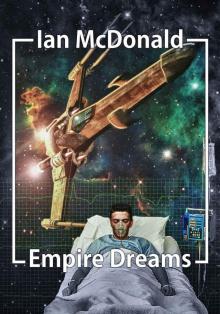 Empire Dreams
Empire Dreams The Menace from Farside
The Menace from Farside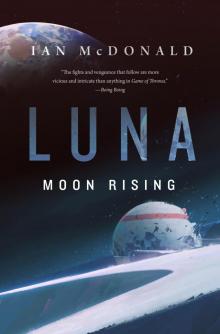 Luna: Moon Rising
Luna: Moon Rising Moon Rising
Moon Rising Desolation Road dru-1
Desolation Road dru-1 Empress of the Sun
Empress of the Sun Ares Express dru-2
Ares Express dru-2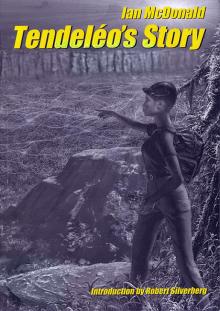 Tendeléo’s Story
Tendeléo’s Story River Of Gods
River Of Gods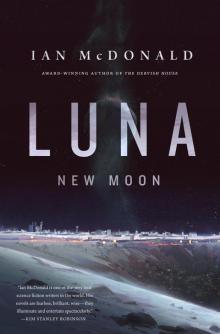 Luna
Luna![Cyberabad Days - [River of Gods 02] Read online](http://i1.bookreadfree.com/i1/03/29/cyberabad_days_-_river_of_gods_02_preview.jpg) Cyberabad Days - [River of Gods 02]
Cyberabad Days - [River of Gods 02]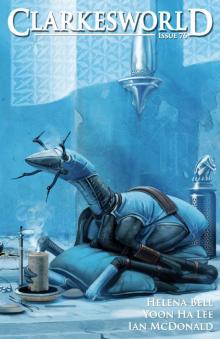 Clarkesworld Magazine Issue 76
Clarkesworld Magazine Issue 76 Brasyl (GollanczF.)
Brasyl (GollanczF.)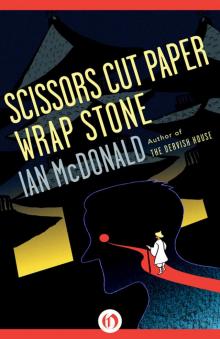 Scissors Cut Paper Wrap Stone
Scissors Cut Paper Wrap Stone Chaga
Chaga Time Was
Time Was Cyberabad Days
Cyberabad Days Be My Enemy
Be My Enemy Changa
Changa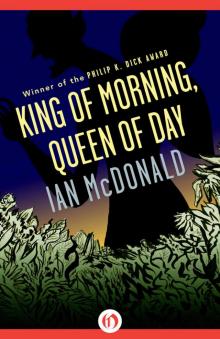 King of Morning, Queen of Day
King of Morning, Queen of Day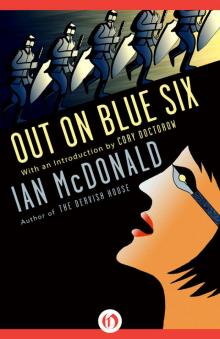 Out on Blue Six
Out on Blue Six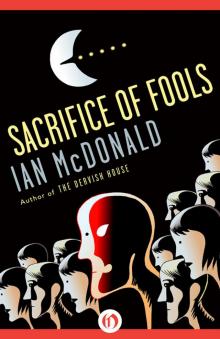 Sacrifice of Fools
Sacrifice of Fools Desolation Road
Desolation Road Luna--Wolf Moon--A Novel
Luna--Wolf Moon--A Novel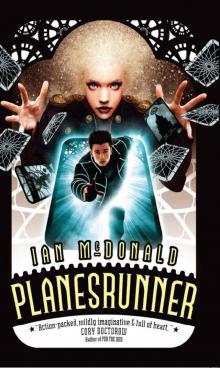 Planesrunner (Everness Book One)
Planesrunner (Everness Book One) Ares Express
Ares Express